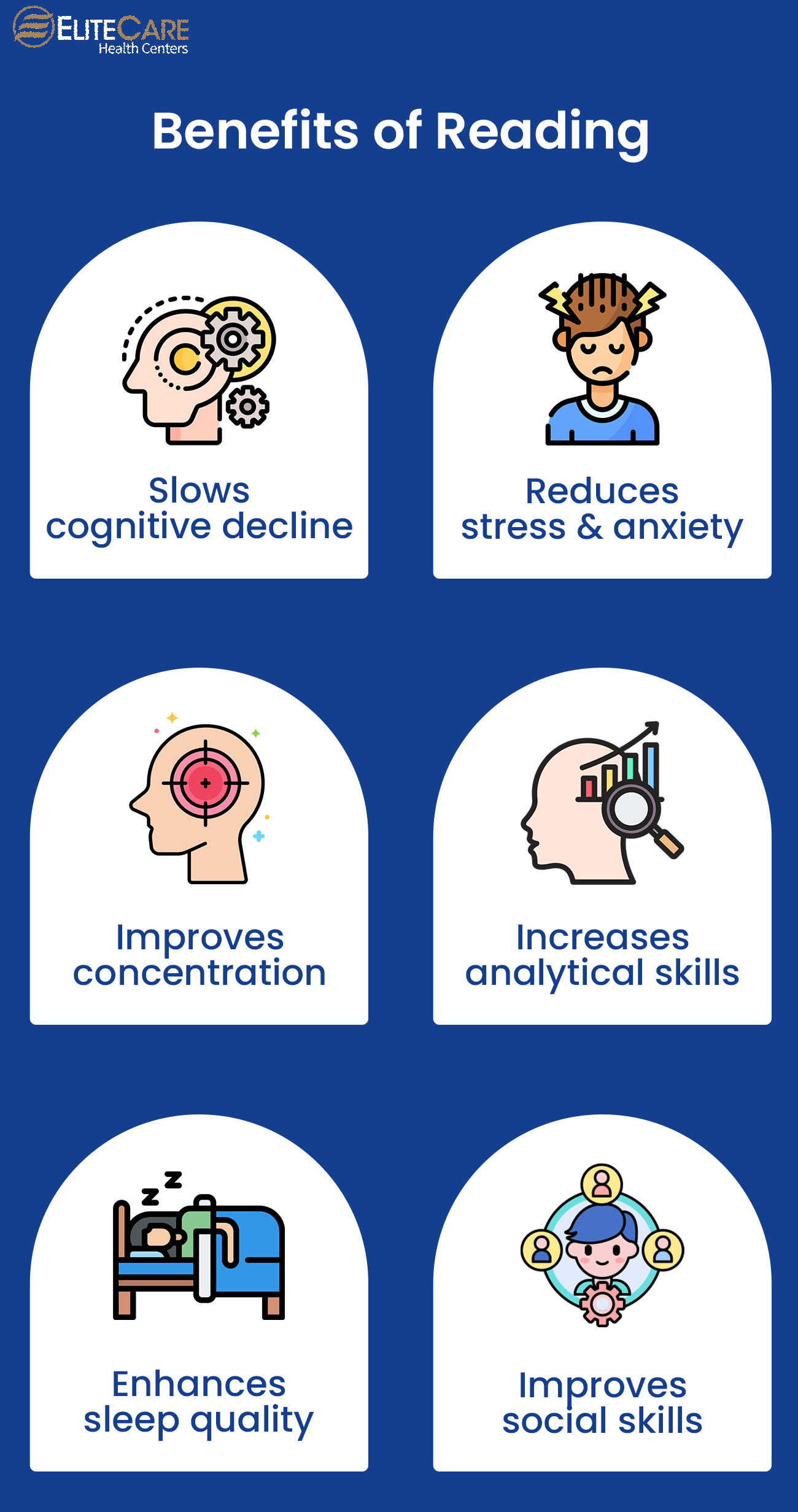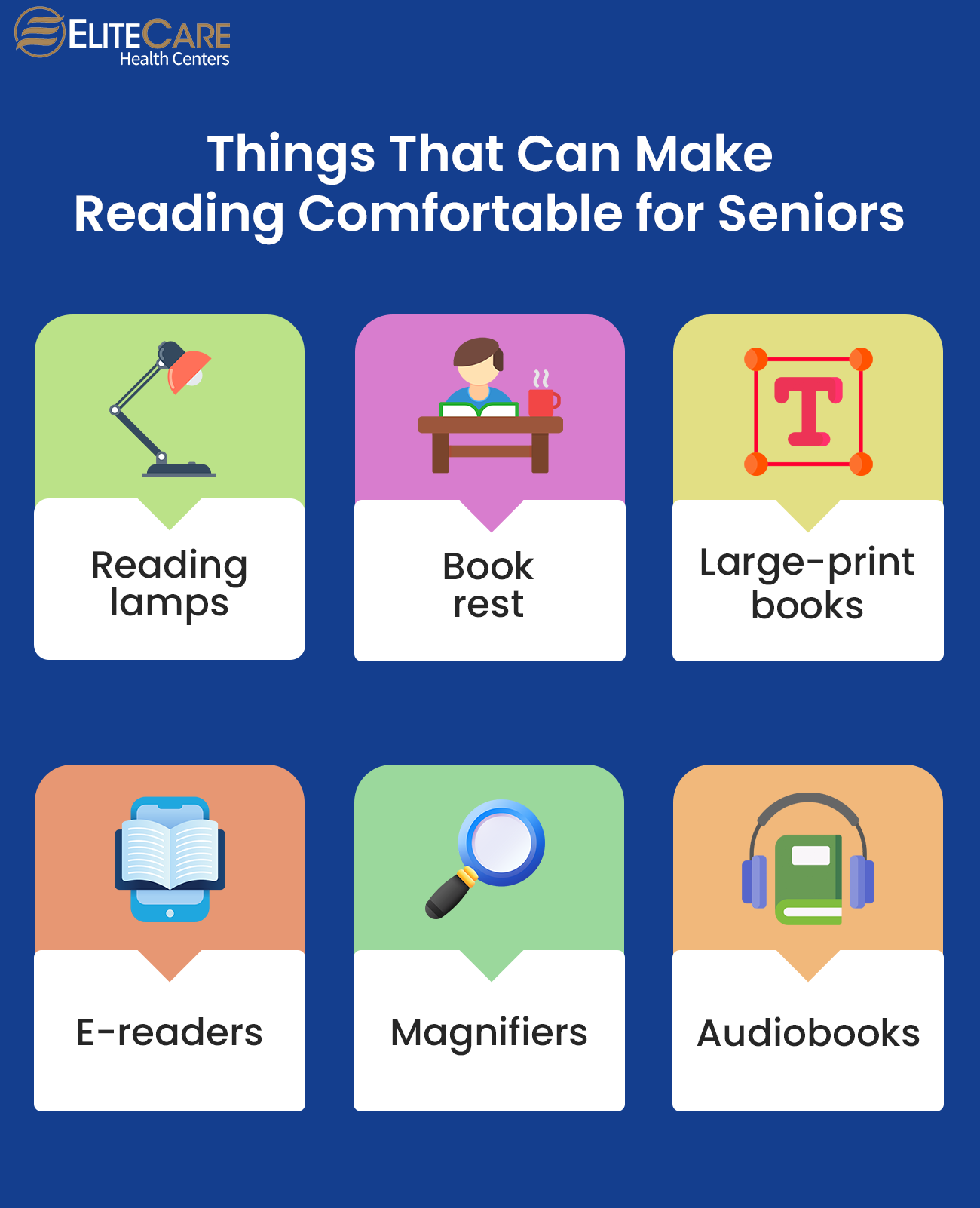
As we celebrate the National Book Lovers’ Day on the 9th of August, we not only rejoice the profound joy of reading but also acknowledge the remarkable benefits it can offer to our seniors.
With age, staying engaged and mentally stimulated becomes increasingly important for overall well-being. Seniors often face both physical and mental challenges, which can be exacerbated by medications they take to manage pre-existing health conditions. At such times, reading can play a transformative role in their lives and serve as a powerful form of therapy, benefiting mental, emotional, and cognitive well-being.
In this blog post, we will share a comprehensive understanding of the benefits of reading and what measures caregivers and family members can take to make reading more comfortable and enjoyable for seniors. Read on to learn more.
Benefits of Reading for Seniors

1. Slows cognitive decline
One of the most significant concerns for seniors is the onset of cognitive disorders, such as Alzheimer’s and dementia. Studies indicate that reading can act as a protective shield for the brain and significantly improve memory, cognition, and attention span. Strong memory retention can help slow down the degenerative process of dementia and Alzheimer’s as it keeps the mind limber.
Researchers have found that individuals who engage in mentally stimulating activities during their lifetime are less likely to develop plaques, lesions, and tau-protein tangles found in cases of dementia.
2. Reduces stress & anxiety
Isolation can give birth to negative thoughts in seniors, particularly for those living away from their close family members, in nursing homes or senior living spaces. Books can help seniors find comfort in a story and its characters and enable them to build a more optimistic attitude.
Besides, reading is a leisure activity that offers a therapeutic escape from the daily stressors of life. Researchers have revealed that reading can significantly decrease the production of the stress hormone cortisol by as much as 68 percent and provide a more relaxed state of mind.
3. Improves concentration
Maintaining focus becomes increasingly challenging with age. Reading requires complete concentration on the story and enables seniors to push their cognitive abilities further to remember the intricating details of the unfolding story.
4. Increases analytical skills
Reading, particularly when engaging with complex narratives or informational material, can help stimulate the brain’s analytical thought process. Analyzing characters’ motivations, new perspectives or comprehending intricate plotlines enhances analytical skills.
5. Enhances sleep quality
Adequate sleep is crucial for overall health, especially for seniors who may struggle with sleep disturbances. Reading before bedtime can promote relaxation and ensure restful sleep.
However, primary care physicians recommend reading somewhere other than the bedroom, which can cause difficulty falling asleep.
Moreover, seniors should choose a print book rather than reading on a screen during bedtime since the blue light emitted from the device can keep them awake for a prolonged period.
6. Improves social skills
The power of storytelling, whether through fiction or non-fiction, can also evoke empathy and emotional connections in seniors. Books can foster a sense of belonging and improve social engagement significantly.
Seniors can also join a book club and build new social connections with like-minded people. Interacting with fellow book enthusiasts creates a sense of community and belongingness, stimulates mental engagement, and provides an avenue for sharing diverse perspectives.
Things That Can Make Reading More Comfortable for Seniors

Although reading is delightful and enriching, seniors may find it challenging due to age-related changes in vision and physical discomfort. While arthritis and back pain can reduce one’s ability to hold a book for long, age-related cognitive decline can make it difficult to concentrate.
However, there are various ways to make reading more accessible and enjoyable for older adults. The following are a few practical solutions:
Use reading lamps
As we age, our eyes require more bright light to read comfortably. A well-positioned reading lamp with adjustable brightness can significantly enhance readability.
Buy a book rest
Reading for extended periods can strain the neck and hands, particularly for seniors with mobility challenges. A book rest or holder can provide proper support, allowing seniors to read hands-free. With the help of a book rest, they can also keep the book at eye level, which can further reduce eye strain.
Large-print books or e-readers
For seniors experiencing age-related vision changes, large-print books can be a game-changer. Larger font sizes can make reading easier on the eyes.
Alternatively, caregivers can also consider e-readers after consulting a primary care physician. E-readers provide options to adjust font sizes and screen brightness, which can be particularly helpful for seniors with vision impairments.
However, these screens also emit blue light which can affect their eyes. Therefore, caregivers or family members should visit a primary care center and take proper medical advice before providing seniors with e-readers.
Use magnifiers
In addition to large-print books, handheld magnifiers can be incredibly helpful for seniors with low vision. Portable magnifiers provide a close-up view of the text, enabling seniors to read fine print or small details without straining their eyes excessively. With the help of magnifiers, seniors can also read books which may not be available in large prints.
Consider audiobooks
Audiobooks open up a world of possibilities for seniors, especially those with visual or cognitive limitations. Seniors may experience difficulty focusing on reading a book. In such situations, listening to audiobooks allows seniors to enjoy stories without the need for visual focus.
The Bottom Line
The benefits of reading for seniors extend far beyond the advantages it offers for mental and cognitive health. In today’s digital age, seniors are increasingly exposed to screens, whether through computers, tablets, or smartphones. By choosing books over binge-watching, seniors protect themselves from the negative effects of prolonged screen time, such as computer vision syndrome, fatigue, and sleep disturbances.
However, caregivers and family members need to remember that everyone’s needs may vary when it comes to reading. Contact EliteCare Health Centers and consult a board-certified primary care physician to receive personalized recommendations based on specific health concerns. We are one of the best medical clinics in Florida, offering a wide range of senior care services including venipuncture, preventive care, annual physical exams, routine dental check-ups, etc.
Let’s celebrate this National Book Lovers’ Day by encouraging seniors to read.






